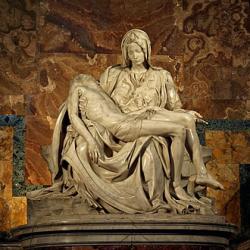All but one of the weekly Mormon Sunday worship services each month are informal, with presentations of "talks," rather than sermons, by people chosen in advance from the congregation. The exception is a monthly meeting, also informal, in which members of the congregation are invited to bear witness of the gospel as they feel moved to do so. What is said in all of these meetings tends toward the homely and the practical.
Adult Sunday School lessons cover the canonized works of LDS scripture (the Bible, the Book of Mormon, the Doctrine and Covenants, and the Pearl of Great Price) in a four-year cycle. The lesson manuals for classes focus on applying the things we learn in scripture to our own lives.
The lessons for men's priesthood meetings and women's Relief Society meetings are taken from the teachings of previous modern prophets. Like the Sunday School lessons, they tend toward application rather than doctrinal instruction.
There is even less theory and theology in the highest LDS liturgical experience, temple worship. The Mormon temple ritual is not at all like a classroom experience. In fact, temple worship is more like participatory theater. And in being participatory, temple worship reinforces our understanding of what it means to come to be like God: to participate in his nature is to do the things that he does.
Jennifer Lane says, "through the ordinances we participate in a way of being that we are becoming" ("Embodied Knowledge of God," Element 2.1 64). Though Lane speaks of our liturgical practices, we could say the same about the other practices of Mormonism: they bring us to know Jesus Christ and promise us the life of the Father. Everything, whether the mundanities of ordinary life or the spiritualities of high liturgy, is designed to be part of our instruction in becoming like God.
So, in spite of the fact that few would recognize Mormon teaching, preaching, and liturgy as instruction in the divine life, that is what we see happening in them. Mormonism incarnates its knowledge of God in its practices; in them he gives us a knowledge by acquaintance of his life, making participation in his nature possible.
In brief, coming to participate in the divine nature means obeying God, as well as submitting to his sacraments and accepting his covenants. We are offered the divine nature in the knowledge that is incarnate in our obedience, submission, and covenant.
Outsiders looking at Mormons may see what appears to be a denial of God's grace and an insistence on works, an emphasis on obedience and works rather than grace. But we understand salvation as partaking in the divine nature through a way of life directed toward and by God. So what might appear to be a denial of grace is really a recognition of it. Mormonism is an instantiation of the belief that grace is received through and in a God-given and God-ordered life.





